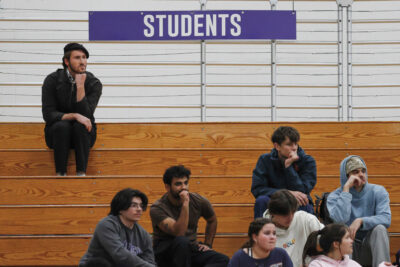Have any of you ever taken an English course and been completely confused by just about every aspect of it? I certainly know that I have. English is the most confusing language I can think of! Our very language is littered with literary hypocrisies and shortcomings. I came to Goshen hoping that all of my wrongs would be righted, but sadly it was to no avail! Even our institutes of higher learning have been infected with this terrible curse.
For instance, let us look back at that first paragraph. How many of you noticed a problem with the third sentence? Well, there is one. I ENDED THE SENTENCE WITH A PREPOSITION! For this to be totally correct, one would need to change the order of things, but they cannot do that without it sounding like this: “English is the most confusing language of which I can think.” Although not horrible-sounding, it does sound odd. But the coup-de-grace comes when you realize that Goshen College breaks the same rule with our motto, “what are you making peace with?” See what I mean about the institutes of higher learning having problems with these things? How can they expect us to learn proper English when they set an example like that?Well, in my haste to prove my point, I fell prey to another of the most classic pitfalls of the English language. The old agreement error. I foolishly started sentence five with, “one would need to change the order of things,” and then concluded with “but they cannot. . .” My problem is that “one” implies only one, where “they” clearly means more than one. There are a few ways to rectify this. I can either go with the traditional WASP idea of making everyone masculine, finishing the sentence with “but he cannot. . .” but that is not the best if I want to be politically and gender correct. My new sentence must be “one would need to change the order of things, but he or she cannot. . .” Without a gender neutral singular term, I can either sacrifice the sleekness of the sentence or the gender indifference. Drats. English language 2, Aaron 0. . .
Guess what, I made another boo-boo. Please review “sentence” two of the previous paragraph. Did you happen to see that it is not a sentence? I suppose that I should have hyphen-ed it to the previous thought, but that did not occur to me until too late. Of course you all would never make such blatant errors when using our beloved language. However, remember my tirade about our college motto? Do any of you happen to recall the motto before our current one? Let me refresh your memory. “The Joy of the Journey”… notice anything funny about this motto? Just sayin’.


